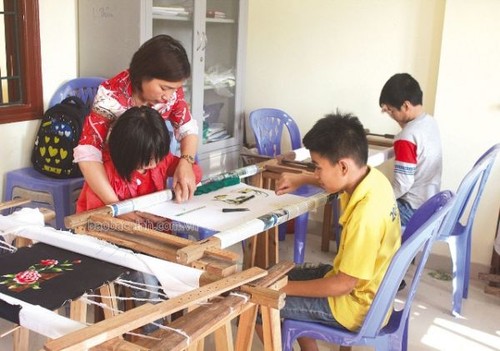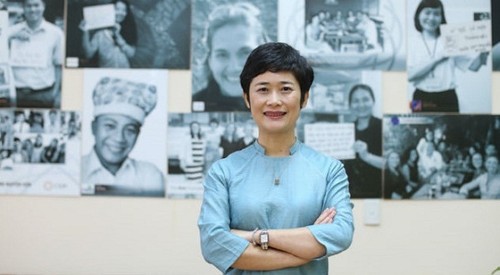 Children with disabilities at a vocational training centre in Bac Ninh province. (Photo courtesy of the Association in Support of Vietnamese handicapped and Orphans) Children with disabilities at a vocational training centre in Bac Ninh province. (Photo courtesy of the Association in Support of Vietnamese handicapped and Orphans) |
In the past, social enterprises focused on disadvantaged people, but now the concept of social enterprises has been expanded to include social impact businesses, which combine making a profit with solving social and environmental issues.
Pham Kieu Oanh, the founder and director of Centre for Social Initiatives Promotion (CSIP) in Vietnam, said, “The difference between regular businesses and SIBs is that the goals of SIBs are to address problems, for example, global warming, climate change, safe food, or issues related to transportation, poverty reduction, equity in health, and education based on a market approach. The SIB targets are to address social problems rather than their own needs.”
She added operating with the dual aim of advancing a social mission through a business model, businesses can take advantage of resources, knowledge, and the ecosystem of business while mobilizing kindness in the community to develop a business in a more sustainable way that has a wider social impact.

Pham Kieu Oanh, CSIP Director, is considered the “midwife” of social businesses. (Photo: Thu Uyen)
|
Oanh explained that as it’s a hybrid model, it has two goals instead of only one – either trading or a social mission. As a result, SIBs have to find a market approach that can harmonize these two goals.
“That's why if we lack a support ecosystem, these businesses in Vietnam, as we have seen over the past 10 years, face a lot of difficulties in their operation. An investor usually aims for either profit or charity. Now we need to attract investors who value both aims. It’s time to increase support for these businesses,” said Oanh.
According to the 2018 study on SIBs, more than 99% of SIBs employ women. These businesses target such sectors as health and wellbeing, education, and environmental protection, and operate in major industries like agriculture, fisheries, and dairy.
 Dr Vu Viet Anh at TechFest 2022 (L) (Photo courtesy of Mr. Viet Anh) Dr Vu Viet Anh at TechFest 2022 (L) (Photo courtesy of Mr. Viet Anh) |
Dr. Vu Viet Anh, Director of Success Edu, and head of the Martech Village of the National Festival for Innovative Startups, Techfest Vietnam 2022, said Vietnam has about 770,000 businesses, only 1,000 of which are SIBs.
“The number is very small. In other words, domestic competition is less. That’s an opportunity for those who start up an SIB business," said Viet Anh.
Le Viet Cuong, Director of the Vụn Art Cooperative where people with disabilities create paintings and other art from silk fabric scraps, touched upon their difficulties. Vun Art is considered a role model in SIB.
Cuong insisted that it's difficult for anyone to start up a business, but it's even harder for the disabled, especially for Vun Art, which specializes in arts.
“So community support, such as painters offering free teaching for our members, is very important. We also face difficulties in capital resources and business management, because, after all, we are a business which should follow corporate law,” said Cuong.
In addition, Vun Art lacks a sustainable market for its products, according to Cuong, adding, “We don’t have capital to do market research, so I have to find ways to come up with commercial products. Another headache is obtaining bank loans, despite priority programs created for people with disabilities by the Bank for Social Policies.”
Vietnam is praised for having a huge potential to develop the SIB model. But to realize it, SIBs must design business plans which take into account all the options for capital sources and output markets as they wait for government support.
Viet Anh recommended, “Ordinary businesses, especially big groups, often set aside a fund to carry out their responsibility to society and serve the community. We can serve as an ecosystem for those big businesses to help them solve problems. If we can connect with and become part of them, we can take advantage of their financial resources.”
Vietnamese SIBs are playing a greater role in realising sustainable development goals and numerous other benefits to local communities, including job creation, greater gender equality, higher living standards, and protection of vulnerable social groups.
It's high time for Vietnam to step up its support for the SIB community, especially during its post-pandemic economic recovery.